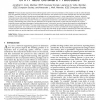Free Online Productivity Tools
i2Speak
i2Symbol
i2OCR
iTex2Img
iWeb2Print
iWeb2Shot
i2Type
iPdf2Split
iPdf2Merge
i2Bopomofo
i2Arabic
i2Style
i2Image
i2PDF
iLatex2Rtf
Sci2ools
102
click to vote
TSE
1998
1998
Cost-Effective Analysis of In-Place Software Processes
—Process studies and improvement efforts typically call for new instrumentation on the process in order to collect the data they have deemed necessary. This can be intrusive and expensive, and resistance to the extra workload often foils the study before it begins. The result is neither interesting new knowledge nor an improved process. In many organizations, however, extensive historical process and product data already exist. Can these existing data be used to empirically explore what process factors might be affecting the outcome of the process? If they can, organizations would have a cost-effective method for quantitatively, if not causally, understanding their process and its relationship to the product. We present a case study that analyzes an in-place industrial process and takes advantage of existing data sources. In doing this, we also illustrate and propose a methodology for such exploratory empirical studies. The case study makes use of several readily available repositori...
| Added | 23 Dec 2010 |
| Updated | 23 Dec 2010 |
| Type | Journal |
| Year | 1998 |
| Where | TSE |
| Authors | Jonathan E. Cook, Lawrence G. Votta, Alexander L. Wolf |
Comments (0)

